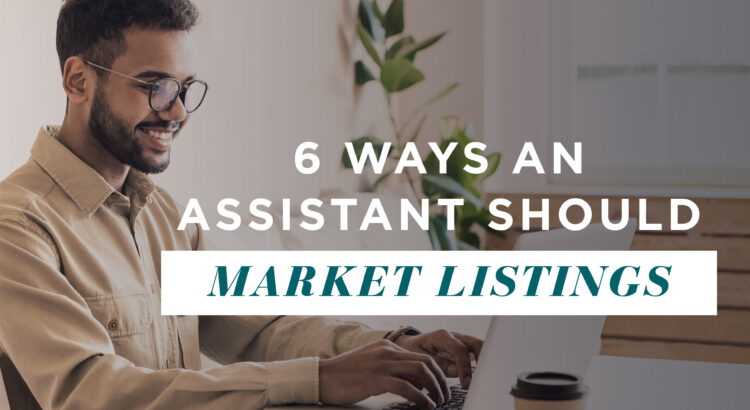Attracting qualified buyers to purchase properties is one of the most important skills that sellers expect their agents to have. As an assistant, you can be very useful in helping your agent reach the right customers. In this post you’ll learn more about how to help marketing listings to sell a home.
#1. Multiple Listing Service (MLS)
The first place your agent will want to put a listing is in the MLS, or multiple listing service, a task that is often the responsibility of the assistant. This database of listings offers agents a centralized location to post details on the properties they have for sale and is an industry standard.
Accuracy in preparing a listing cannot be overstated. Not only is the MLS the central location for your listing, but websites that are accessible to any potential home buyer, such as Trulia, Zillow and Realtor.com, use the data directly from the MLS. So remember to check and double-check that the specifications and descriptions for the property are exactly as you want them.
Besides the standard form data, which includes details on the home such as square footage and the number of rooms, you’ll have an opportunity to provide a description. This description will appear on the listing sheet and on any websites that pick up MLS data. It’s important that this copy be focused on selling the home, and as such, it should be treated like any other marketing material.
#2. Uploading and Optimizing Photography
Photography is one of the most important parts of your marketing plan and should be handled with care. You may consider outsourcing listing photos to a professional company. Along with ensuring that your photographs are of the best quality, there are a number of other concerns when preparing your photos to upload.
Photos should be beautifully lit, color-corrected, cropped properly and able to show off your property’s best qualities. In addition, your MLS may have limits on the size and dimensions of the individual images you upload, so familiarize yourself with its requirements before you begin.
Most MLSs allow a maximum of 25 photos, but don’t confuse quantity with quality. A photo of the exterior of the home is standard, and it’s a good strategy to have at least one photo per each feature mentioned in your description. For example, a description that mentions an attached garage, a bay window and high ceilings should have photographs that show each of these features.
#3. Social Media
The most popular social media platforms used in real estate are Facebook, LinkedIn, Twitter, Instagram, TikTok and Pinterest. Your agent might use one, some or all of these. Each platform comes with its own set of analytics, so you can easily see if your posts are effective in driving engagement and, ultimately, sales.
Facebook and Twitter allow you to schedule posts, but if you’re using more than one platform, a dashboard like Hootsuite allows you to generate all your posts from a central location. Depending on your subscription level, you can easily replicate posts across platforms and receive great analytics to help you determine how well your posts are performing.
#4. Traditional Advertising
In many cases, traditional media is still very effective for the real estate business. Your agent may be getting great results from direct mail postcards and advertising in print and online.
Using postcards to let neighbors know what was just listed or just sold works because it offers market information, as well as exposure for listings and the agent. Make sure that the photos look great, the message and the call to action are clear, and the brand is properly reflected. Advertising in print is effective in certain markets, but not in others.
Online advertising allows potential clients to click through the ad to the agent’s website or send an email. And don’t forget to look into marketing opportunities on syndication sites like Zillow. These can help with lead generation. Ultimately, advertising works best when you know who your target market is and how best to reach them.
#5. Surveys, Testimonials and Reviews
There is much more marketing that you can help with as an assistant. A completed transaction is not the end of the relationship. There is still marketing work to do! It’s a good idea to send a survey to clients after a transaction is finished to let them share the pros and cons of their experience with the agent. This information is useful to agents so they can make improvements to their systems and services.
And getting testimonials and reviews on sites like Yelp can really help an agent get new clients and stand out from the competition.
There are third-party survey services that are simple and inexpensive to put into practice. This should be part of your operating procedure at the close of every sale.
#6. Participate in the Neighborhood
Lastly, one of the best ways to market the business is by simply being top of mind when it comes to real estate in a given neighborhood. The simplest and most effective way to do this is by actually spending time participating in the community. Consider volunteering at the local school. Suggest that your agent sponsor neighborhood events, or simply make sure to get a table at them. Seek out opportunities to put your agent in front of the right target market.
No one likes someone who only talks business, but there’s nothing wrong with being helpful and relevant. If you keep your ears open and engage with people, you will find organic ways to help market the company and make it truly feel like part of the neighborhood.
It’s important to remember that selling homes is only one part of an agent’s business. It’s just as imperative to ensure that agents have a future flow of potential customers and that the brand and reputation are being managed in the best way. To learn more about an assistant’s role working with an agent, sign up for AgentEDU’s Assistant Certification Course, an eight-part course designed to teach assistants everything they’ll need to set their agent up for success.
_____________________________________________________________
AgentEDU® is a platform where agents at every level can come to watch 10-minute video courses for the many situations that successful agents must master. From essential to advanced level and everything in between, AgentEDU® courses help agents become top producers with increased earnings and a plan for continued growth. For a seven-day free trial, sign up here.
AgentEDU® is an Agent Publishing brand. For nearly two decades, Agent Publishing has been committed to providing residential real estate professionals with the information and training required to build successful and meaningful careers in their local markets. Agent Publishing’s influence extends to every career stage and reaches agents across print, digital, events and online learning.


